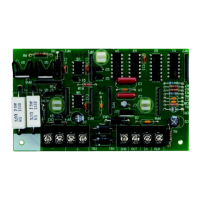D8125 Operation and Installation Guide
D8125
Page 12 © 2004 Bosch Security Systems, Inc.74-04247-000-N
Overview
If the positive or negative leg of the data expansion bus becomes shorted to a Common terminal on the D7212G then all
POPIT’s will report a missing condition. In addition to this, a PT BUS TROUBLE event will also be generated.
If Terminal 28 becomes shorted to a Common terminal, a PT BUS TROUBLE event will not be generated. However, a short
between Terminal 27 and a Common terminal will generate a PT BUS TROUBLE event and the command center will display
SERVC ZONEX 1. If Terminal 27 and Terminal 28 are shorted together, a PT BUS TROUBLE event is generated and the
command center will display SERVC ZONEX 1.
The D7212G will respond to missing point conditions based on how the points are programmed and which armed state the
area is in that the point is assigned to. For example, if an interior motion detector point went missing during a disarmed
state, a MISSING TROUBLE event would be generated. However, if the point went missing while the area was Master
Armed, a MISSING ALARM event would be generated. Non-fire 24-hour points always generate a MISSING ALARM event
whereas Fire points always generate a MISSING FIRE trouble event.
2.3.1 D8125, D8127 and D9127 POPIT Modules
D8127 and D9127 POPITs use the D8125 POPEX Module to report to the panel. The D8125 supports up to 32 POPIT points
(Points 9 to 20). The panel only annunciates activity for each POPIT, not each detection device connected to the sensor loop.
There are two versions of the D8127 and D9127 Modules. Both module enclosures are made of UL Listed fire resistant
material. D8127T and D9127T Modules contain tamper switches. D8127U and D9127U Modules come with untampered
covers. Unless the module is mounted in a tampered enclosure, UL requires D8127T and D9127T Modules for certificated
accounts.
2.3.1.1 Listings
The D8125 POPEX and the D8127 and D9127 POPIT Modules are UL Listed for use with the D7212G for Central Station,
Local, Police Connect, Bank Safe and Vault, Mercantile Safe and Vault, and Grade A Household systems, and Proprietaryas
a Control Unit for Household Fire Warning. The D7212G is not listed for commercial fire applications.
See the D7212G Approved Applications Compliance Guide (P/N: 4998138560) to determine the required equipment and
enclosures for the application.
2.4 Non-G 9000 Series Point Expansion
On the D9412/D9112, you can use POPIT (Point Of Protection Input Transponder) modules to provide up to 238 off-board
points, bringing the total number of points the D9412/D9112 can monitor to 246. The D7412/D7212 can provide up to 67
off-board points bringing the total number of points the D7412/D7212 can monitor to 75. Each off-board point requires a
POPIT module.
POPITs connect to supervised two-wire data expansion loops run from POPIT to POPIT throughout the premises. Data
expansion loops connect to a D8125 POPEX (Point Of Protection EXpander) module. POPEX module(s) connect to the
point buss on the panel, Terminals 23 and 24 for power (3 and 9 on the D7412 and D7212), and terminals 25 and 26 (D9412/
D9112 only), or 27 and 28 for data.
If a POPIT is disconnected from the expansion loop, a trouble message appears immediately. See the D9412G/D7412G
Program Entry Guide (P/N: 47775) for programming options.
If you connect a POPIT to the expansion loop that is programmed for a point number that does not appear in the program
for the D9412/D9112, it appears as a trouble condition when the data expansion loop restores from a faulted condition. A
faulted condition on the data expansion loop includes:
1. Positive leg of the data expansion loop shorted to ground.
2. Negative leg of the data expansion loop shorted to ground.
3. Data expansion loop (positive or negative leg) becomes disconnected.
4. Data expansion loop becomes shorted.
Placing a short on the data expansion loop generates a PT BUS TROUBLE report. The panel sees all points on the shorted
expansion loop as shorted, and responds according to point programming, except for fire points. The fire points will
respond locally as a trouble condition and transmit missing fire reports if programmed during this condition.
POPIT modules monitor their sensor loops for three conditions, loop normal, loop open, and loop shorted. They report
these three conditions to the D9412/D9112.

